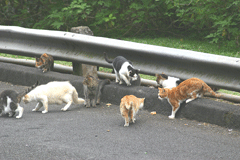
Feral cats in Hawaii. (Photo: Flickr/Sara Golemon)
Feral cats in Hawaii. (Photo: Flickr/Sara Golemon)
Some feral cats in California have been given jobs with the Los Angeles Police Department... as mousers. Host Steve Curwood talks with Commander Kirk Albanese who helped organize the feral cat program with the LAPD.
CURWOOD: Experts reckon there are about seventy million feral cats in the U.S. These are the offspring of domestic pets that got lost or ran away—and they’re blamed for the wholesale slaughter of millions of wild birds. Now a unique program called ‘working cats’ has found a job for feral cats—dealing with other widespread pests—rats and mice.
Voice for the Animals Foundation collects these wild cats, has them spayed or neutered, and then relocates them to places over-run with rodents. The Los Angeles Police Department’s Southeast Division is the newest ‘home’ for a colony of feral cats. LAPD Commander Kirk Albanese helped organize the working cats at several police precincts. So commander, how bad did the problem get?
ALBANESE: It got bad enough that inside the station, we actually had mice that would run across the top of desks and obviously employees didn’t want to see that. And so it was a big enough problem where it was impacting the morale of the work force and we needed to do something about it.
CURWOOD: So you have some cats down there at the police station. How does this work—the cats kill the rats, they have access to an easy meal?
ALBANESE: No. The cats, the scent that they produce, keeps the rodents away. The rodents are afraid of the animals and the cats don’t have to kill the rodents at all. They stay away because of the scent. They don’t want any part of the same neighborhood with the cats and they go on to other places.
CURWOOD: So it’s like one tough gang moves in and the other one moves out.
ALBANESE: Yeah, you could use that analogy. Absolutely.

Feral cats in Hawaii. (Photo: Flickr/Sara Golemon)
ALBANESE: It’s nature. There’s no spraying. There’s no chemicals. There’s no traps. We feed these animals like you would feed any other cat and provide kitty litter and a little housing—a cat crate or whatever they call it. And that’s it.
CURWOOD: How do you condition these cats to work at the police station? And can you use these elsewhere, say in a school or someplace else that also has a rodent problem?
ALBANESE: The way we condition them is they’re kept in a cage—their cat cage—for a couple of weeks. And that allows them or causes them to become territorial. It also allows them to colonize with the other cats that are there next to them. And then when they’re removed from the cages, they stay on the property. And if I had a business with a rodent problem this would definitely be the direction I would go. The exterminators probably don’t want to hear that but I’m convinced it’s a very effective method of dealing with a difficult problem.
CURWOOD: What would be the fate of these feral cats if they didn’t get jobs at the police station?
ALBANESE: Well, if they were at a shelter, eventually they’d be euthanized.
CURWOOD: So, this is really a lifesaving opportunity, then?
ALBANESE: Yeah. I think you could literally say that it’s a lifesaving opportunity and it’s a good deal for us and for the cats.
CURWOOD: So, you’d rate this as fairly successful, then?
ALBANESE: I would rate it as highly successful. In fact, we’re now expanding the program to other stations. We use at (inaudible), at Foothills station, which is one of our older facilities and has a basement where we kept just records—case files and whatnot. And we had a lot of mice down in the basement for whatever reason they congregated down there and at night they would come up, run down the hall, and search for food or whatnot and so that was a problem there. We actually in that case, we put the feral cats in the basement, which solved the problem there.
CURWOOD: Now I’ve got to ask you, commander. I know these are tough guy cats, tough bay cats, they don’t pay any mind to you but maybe you have a favorite, anyway?
ALBANESE: (laughs) You know what, I have to tell you I think they were—because they solved the problem for us—they were all my favorite. You know, I knew what they were doing out there and just by their mere presence so I was very much a proponent and instructed my people, ‘drive out of there with caution, make sure we don’t hit one of these little guys.’ And to date we have not, they stay out of the way of the moving cars. So, they’re all my favorites.
CURWOOD: Kirk Albanese is a commander with the Los Angeles Police Department. Thank you so much.
ALBANESE: My pleasure.
Links http://www.vftafoundation.org/ - Voice for the Animals Foundation